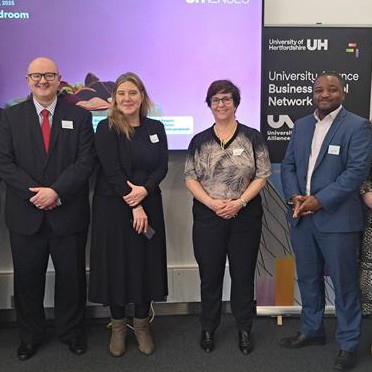A new report has identified several significant barriers to the expansion of degree apprenticeship routes to deliver the workforce targets as set out in the NHS Long-Term Workforce Plan.
To coincide with National Apprenticeship Week, University Alliance (UA) and the University of Derby has today (Monday 10 February) published a comprehensive report that explores the current enablers of and barriers to delivering healthcare apprenticeships.
In particular, the report focuses on expanding apprenticeship participation for Allied Health Professionals (AHPs), nurses, and doctors in England, and responds to the targets as set out by the NHS Long Term Workforce Plan (LTWP), published in the summer of 2023.
The report highlights financial constraints and disincentives, issues with capacity and support, as well as coordination challenges between employers and education providers.
Using existing evidence, a survey and in-depth qualitative interviews of current and former apprentices (alongside employers and staff at higher education institutions), the report provides targeted policy recommendations for employers, universities, policy makers and government to overcome these barriers.
Policy recommendations include:
For the government to make financial reforms, including:
- increasing flexibility in the apprenticeship and skills levy to cover backfill, supervision, and other related costs for healthcare organisations;
- fairer distribution of apprenticeship funding across regions and specialties;
- retaining level 7 apprenticeships for skills and roles in demand.
For better employer-education partnerships, by:
- fostering early collaboration between employers and education providers to define roles, expectations, and responsibilities;
- designating a dedicated Higher Education Institution (HEI) contact to streamline communication with and support for employers;
- improving communication and collaboration between employers and higher education institutions to focus on providing conjoined support for apprentices.
Increased capacity building, including:
- investment in infrastructure to increase clinical placements and dedicated support roles for apprentices;
- streamlining regulations and offering clearer guidance to reduce the administrative burden on employers and providers;
- increasing resources for clinical supervisors to enable effective mentorship while managing workload;
- upgrading technology and platforms within higher education institutions and employer partners to support apprenticeship management and placements.
Improved public awareness and perception of degree apprenticeships, including through:
- promoting apprenticeships as valuable healthcare career pathways through public and media campaigns;
- partnering with schools to present apprenticeships as viable alternatives to traditional routes, and including successful apprentices in outreach efforts to build credibility and inspire new entrants.
Improved policy coordination, by:
- improving coordination between government departments in healthcare, education, and employment for cohesive policymaking;
- aligning apprenticeship policies with government workforce plans or strategies to address future workforce needs;
- promoting a sustained and long-term plan and commitment towards growing apprenticeships, rather than short term plans.
Dr Denise Baker, Chair of the University Alliance Deans of Health Network, and Pro Vice-Chancellor and Dean of the College of Health, Psychology, and Social Care at the University of Derby, said:
“Degree apprenticeships are at the heart of NHS England’s plan to grow the healthcare workforce. Despite apprentices valuing the opportunities that apprenticeships bring, our new report highlights that there are still significant challenges that are hindering their expansion: whether it be a lack of capacity for delivering placements, or an off-putting number of burdensome regulations and financial disincentives for employers and educators.
“Apprentices we interviewed were hugely enthusiastic about apprenticeships, but still recognise that there are more improvements to be made to how they are supported through their learning journey. Persistent issues of capacity and resource must be addressed to ensure apprenticeship programmes can be delivered sustainably. Finally, the perception that apprenticeships are somehow less valued needs to be tackled with stronger public awareness of the benefits of healthcare degree apprenticeships in order to drive recruitment and retention.
“As one of the authors of the report, I hope policymakers who wish to make the most of the Workforce Plan’s promise to expand the healthcare workforce take heed of the report’s insights and recommendations.”
Vanessa Wilson, CEO of University Alliance said:
“Professional and technical universities like those I work with as part of University Alliance excel in delivering healthcare apprenticeships, including degree apprenticeships. They are pivotal to supplying the future healthcare workforce, and are a transformative option for learners, particularly those from disadvantaged backgrounds.
Healthcare apprenticeships are currently a shifting policy environment, with the proposed removal of levy funding for Level 7 apprenticeships a likely drag on high-level skills development in the NHS, and with continued uncertainty around the new NHS 10-year plan and a refreshed workforce plan expected later this year.
We are saying that, to scale up apprenticeship provision in healthcare, there are significant, but not insurmountable barriers and disincentives that must be tackled collectively by higher education institutions, employers, NHS trusts and policymakers across government.
Released in time for National Apprenticeship Week, this report is a timely reminder of both the current difficulties of providing degree apprenticeships, and the solutions required to deliver the nation’s healthcare workforce needs.”
About University Alliance
University Alliance (UA) represents 16 world-leading professional and technical universities. Our members specialise in working with industry and employers. Their teaching is hands-on, and designed to prepare students for careers. Their knowledge and research drive industry to innovate, thrive and meet challenges.
Our members are leading the way in innovation and business support in the green, tech, creative and healthcare industries. They educate 1 in 3 of the country’s nurses. They are leading providers of teaching in healthcare, the creative arts, degree apprenticeships and more.
We collaborate as UA to benefit our members and their communities, and to provide expertise to policy makers.
UA’s members are: Anglia Ruskin University, Birmingham City University, University of Brighton, Coventry University, University of Derby, University of Greenwich, University of Hertfordshire, Kingston University, Leeds Beckett University, Middlesex University, Oxford Brookes University, Robert Gordon University, University of South Wales, Teesside University, University of West London, UWE Bristol.
Follow @unialliance on X and on Bluesky.
About the University of Derby
The University of Derby is an ambitious, innovative, and modern university offering industry-relevant, expert teaching, from foundation and undergraduate degrees to postgraduate study and research.
Derby’s academic strength is backed up by practical experience to ensure its students are ready for a successful career, wherever their talents lie. With more than £200 million invested in the last ten years, the University offers some of the best university facilities in the UK, including a Nuclear Skills Academy, developed in partnership with Rolls-Royce Submarines Ltd, STEM Centre, Forensic Training Facility and NHS-standard hospital ward.
At Derby, academic expertise, world-leading research and innovation is used to foster talent, support skills development and promote links with businesses regionally, nationally and globally. As well as traditional degree routes, the University offers apprenticeships from levels 2-7 for a wide range of job roles, working with high-profile employers including Rolls Royce, the NHS and the Institute of Quarrying. In addition, continuing professional development, knowledge transfer and sector-leading online courses create opportunities for individuals, employers and communities to develop and flourish.




